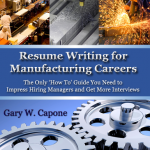Job seekers overuse the phrase “Responsible for” on their resumes. It is an easy phrase to use. Just put “responsible for” at the start of a bullet and describe some aspect of the job.
Writing a resume like this will not make a good impression. A resume I read today illustrates this very well. The resume is from an insurance agent, but it makes it hard to determine whether the agent was successful. The resume and cover letter contained details that fail to create a clear picture of the job seeker’s performance.
A resume should provide a clear statement of the success of the job seeker. Instead, it lists a number of responsibilities and sales goals. The resume never comes right out and says whether the job seeker achieved the goals. Below are the bullets under the most recent job listed:
- Responsible for sales, management, marketing and service of commercial, life, group, LTC, and voluntary benefit insurance products, as well as pension plans
- Directly responsible for increasing the territory book of commercial business from $#.# million to $#.# million over a # year period.
- Responsible for increasing group life customer base from 0 to ## current groups.
- Responsible for increasing LTC book from $0 to $###,000.
- Responsible for increasing territory pension assets from $#.# million to over $#.# million in just over # years.
- Directly responsible for increasing current commercial client base from ## accounts to ## accounts.
- Responsible for increasing life insurance book from $##,000 to $###,000 over # years.
There are two ways to read this. You can assume the statements are a list of sales goals the agent was responsible for hitting, or you can assume the statements detail the specific results the agent achieved. If they are goals, there is nothing to indicate the agent was successful in achieving them. When a hiring manager is screening hundreds of resumes, and only spends a very short time skimming each, you can count on the hiring manager to be very skeptical. Most will assume the job seeker was unsuccessful if the job seeker does not specifically detail the successes.
Further hurting the presentation, the job seeker uses two different phrases, “responsible for” and “directly responsible for” in the bullets. There’s a chance the job seeker is just trying to vary the structure and reduce the repetitiveness of the resume. It is also possible the job seeker is showing the difference between individual and group goals or accomplishments.
Recommendations
The changes to correct this are easy to implement. If the bullets detail specific accomplishments and not sales goals, each bullet (except the first) should be changed to eliminate the “responsible for.” Below are the revised bullets:
- Responsible for sales, management, marketing and service of commercial, life, group, LTC, and voluntary benefit insurance products, as well as pension plans
- Increased the territory book of commercial business from $#.# million to $#.# million over a # year period.
- Developed the group life customer base from 0 to ## current groups.
- Developed the LTC book from $0 to $###,000.
- Increased the territory pension assets from $#.# million to over $#.# million in just over # years.
- Grew the current commercial client base from ## accounts to ## accounts.
- Increased the life insurance book from $##,000 to $###,000 over # years.
This reads much better and provides a stronger impact. The contributions of the job seeker are clear after these minor changes.
If the job seeker did not achieve these goals, rewriting the bullets will take a little more work. The job seeker will need to identify their specific accomplishments and write about these. The numbers may not be as impressive, but they will be genuine and honest. This will help the impression the resume makes.




